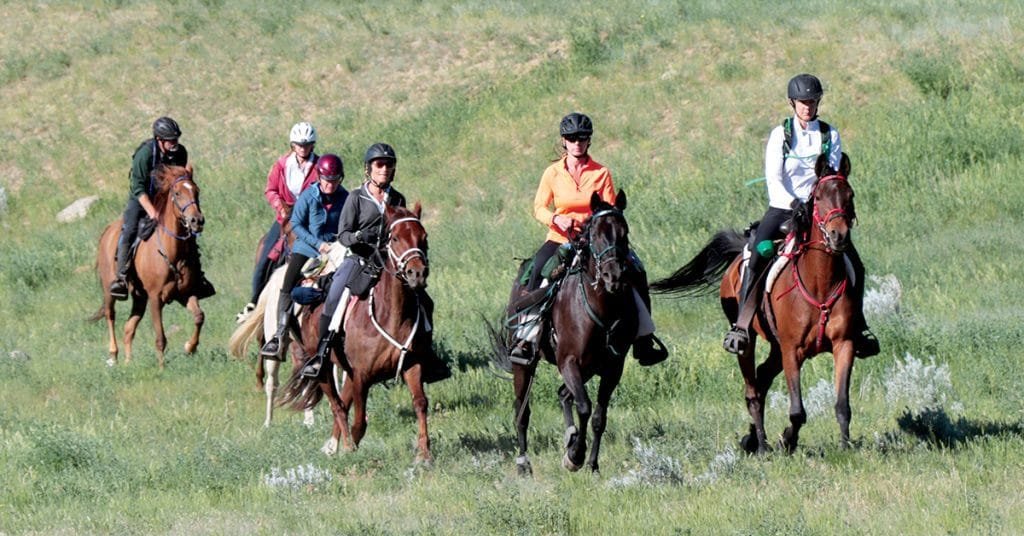Gearing up for a big event, traveling to a new location, or simply in a rigorous training routine, proper care can make all the difference
Horses love to be on the move, and regular exercise helps keep them physically and mentally fit. They also require high-quality nutrition to keep their bodies strong and healthy, and performance horses have unique nutritional needs because of the rigorous training, competition, and overall health. In fact, these horses may have nutritional needs beyond what their regular diets provide, especially ones who train rigorously or are preparing for, participating in, or recovering from competition or travel. These nutrition and health tips will help keep your horse in top shape and support equine performance.
1. Nutritional Support
Balanced Diet: Ensure your horse’s diet is balanced and meets their specific needs. A well-rounded diet should include high-quality forage, appropriate grains, and supplements tailored to their activity level.
Hydration: Keep your horse hydrated, especially during and after exercise. Access to fresh, clean water is vital. Adding electrolytes to their diet can help replace essential minerals lost through sweat.
Pre-Competition Feeding: Adjust feeding schedules and quantities before a competition. Provide easily digestible foods that offer sustained energy without causing digestive upset.
2. Exercise and Conditioning
Structured Training: Implement a well-structured training program that gradually increases in intensity. Avoid overtraining to prevent injuries and ensure your horse remains enthusiastic about their work.
Variety in Workouts: Incorporate a mix of exercises, including flatwork, jumping, and conditioning. This helps develop a well-rounded physique and prevents boredom.
Rest and Recovery: Schedule regular rest days to allow your horse to recover. Recovery is crucial for muscle repair and overall health.

3. Travel Tips
Pre-Travel Preparation: Before traveling, ensure your horse is comfortable with loading and unloading. Practice these skills to reduce stress during actual travel.
Comfortable Travel: Use appropriate travel gear, such as boots or wraps, to protect your horse’s legs. Ensure the trailer is well-ventilated and has enough space for your horse to stand comfortably.
Post-Travel Care: After arriving, give your horse time to stretch and move around. Check for any signs of stress or discomfort and offer water and a small amount of forage to help them settle in.
4. Competition Readiness
Grooming: Maintain a regular grooming routine to keep your horse clean and comfortable. Good grooming helps prevent skin issues and allows you to check for injuries or signs of illness.
Tack and Equipment: Ensure all tack and equipment are in good condition and properly fitted. Ill-fitting gear can cause discomfort and affect performance.
Warm-Up and Cool-Down: Implement a thorough warm-up before competition to prepare your horse’s muscles and joints. A proper cool-down afterward helps with recovery and prevents stiffness.
5. Health Monitoring
Regular Check-Ups: Schedule regular veterinary check-ups to monitor your horse’s health. Keep up with vaccinations, dental care, and parasite control.
Observe Behavior: Pay attention to any changes in your horse’s behavior, appetite, or performance. These can be early signs of health issues that need addressing.
Maintain Records: Keep detailed records of your horse’s health, training, and competition history. This information is valuable for tracking progress and managing any health concerns.
6. Mental Well-Being
Stress Management: Manage your horse’s stress by providing a consistent routine and a calm environment. Familiar surroundings and a predictable schedule can help reduce anxiety.
Social Interaction: Allow your horse to interact with other horses and engage in social activities. This can improve their mood and overall mental health.
Positive Reinforcement: Use positive reinforcement during training and competition to build confidence and encourage good behavior.
7. Emergency Preparedness
First Aid Kit: Keep a well-stocked first aid kit readily available. Include items such as bandages, antiseptics, and basic medications.
Know Emergency Procedures: Be familiar with basic emergency procedures and have a plan in place for different types of emergencies, including injuries and sudden illnesses.
Contact Information: Have the contact information for your veterinarian and nearest emergency clinic easily accessible.




